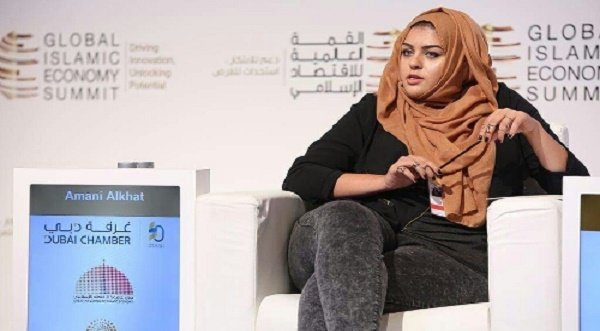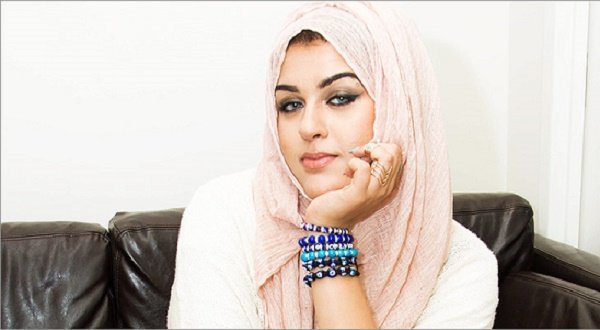
Maryam Ismail speaks to Amani Al Khatahbeh, the founder of Muslimgirl.net, during the recently held Global Islamic Economy Summit in the UAE, about the experience of growing up in the United States as a Muslim woman wearing hijab
[dropcap]W[/dropcap]hen your back is against the wall you have two choices, prepare to die or prepare to tear ‘em to pieces. At 17, Amani Al Khatahbeh, was ready to come out fighting when she created Muslimgirl.net. “I wanted to portray Muslim women in an authentic and real way,” says the teen activist.
I found Amani Al Khatahbeh by accident. The elegant patio was a sweaty sauna during lunch at the Mina Salaam, part of the upscale resort Madinat Jumierah. I happened to be sitting at the table next to her when I overheard her say, “I founded Muslim Girl, a website for Muslim women…” I jumped tables to find out more. She was NYC cool — black hijab and lightweight fuchsia sweater over a T-shirt.
“How long is this interview going to be?” Al Khatahbeh asks. Girlfriend is serious in her dark shades and no smile, but I push on. “Ten minutes, “I replied. I must have wiped my forehead five times, while sitting at the other table so there is no way that it could be any longer.
“Muslim Girl is a platform to elevate our voices and to take about issues that are relevant to us. We were frustrated about how media not only talks about us, but who is doing the talking about Muslim women. For the most part it is non-Muslims and men. We want to speak for ourselves and reclaim our narrative in the media instead of constantly being spoken over,” says Al Khatahbeh.
A Rebel with Many Causes
In her short time on this planet, her story reminds me of the Muslim greats of the golden age, who by the time they were in their mid-twenties were ruling empires. Her resume will make you dizzy. Search her name on Youtube and you will find her standing outside the White House protesting against President Barack Obama’s iftar, which hosted Ron Dremer, the Israeli Ambassador to the United States while Israel was wantonly killing Palestinians during the Ramadan 2014 war.
Al Khatahbeh, who also happens to be a Palestinian, was the media specialist for the American Arab Anti-Discrimination Committee at the time, declared that the organization would boycott all governmental iftars of 2014. “We should be boycotting these iftars due to the government’s condoning of the slaughter of civilians in Palestine and the spying on Arab and Muslims domestically.” During this speech she calls on the presidential guests, to turn around and go home in protest.
Digital Millennials
Khatabeh was at the GIES hosting and participating on two different panels. As we talked, I learned that there is a lot of work to be done, but there doesn’t seem to be enough room for everyone to speak.
Maryam Ismail: Tariq Ramadan gave a speech a while ago in Turkey, where he said: “You may think that you are contributing to the narrative, but we are in fact, being used to fit an agenda.” For example in media, there is a highlighting of a certain type of Muslim woman, the modern millennial, sporty girl. You know what I mean?
Al Khatahbeh: Yes, absolutely. It’s interesting, because we just were in a State Department meeting a few days ago, for the UN General Assembly and the question was how we as Muslim storytellers could get our own narratives in the media. This led to the discussion about how we need to get more people in media spaces, more people talking about issues that pertain to us. Then, this lady who made the documentary Budrus said: “Look, we made a wonderful piece of art that was celebrated all over the film festival circuit, but it was rejected in the US by all of the media outlets because it showed Palestinians in a positive light.”
So what is the point of having these people in media if media is tell being selective of what narratives the want to portray?
MI: I see.
Al Khatahbeh: It is in the best interest of American media outlets to portray Muslims accurately. Nevertheless, it is not happening. This is why it is important for us to be creating and cultivating our own Muslim media and this is why MuslimGirl.net exists. When the mainstream media rejects the opinions of Muslim women, they come to us and we publish them. The rapid growth of our readership is a testament to the fact that people are interested in what we have to say.
“Some are rejected because they don’t uphold the status quo”
On MuslimGirl.net you will find some surprises, however, they are as real as they get. Titles such as 99 Excuses for White Criminals, dedicated to Muslim activist, Linda Sarsour, which satirizes how the white terror is handled in the media. Then Muslims with Opinions, are put on notice with a piece that warns the Muslim community to be careful what you say and do, because you could end up in world of trouble.
MI: Five years ago, I asked writer Wajahat Ali, “Why there weren’t any positive portrayals of regular Muslims, who are just living their lives, praying five times a day?” and he didn’t have an answer.
It’s not really about changing Muslim identity, it’s more about creating room to really represent the complexity of Muslim identity because it’s not one-dimensional or two-dimensional; especially for my generation, the Post 9/11 generation. For our generation, it’s about making those cracks from which there comes room for us to explore identity.
Al Khatahbeh: Definitely. You see it’s not our responsibility to have to push back like this. This burden has been placed upon us. We have to constantly defend ourselves. We have to fight for space in the media; we have to prove that we are human beings, and we have to denounce terrorism. As Muslim women, especially the ones who wear hijab, we are placed as ambassadors of Islam in non-Muslim countries, that’s a really hefty responsibility. It’s not one that we chose. And you know, we shouldn’t have to live our lives in a place of defensiveness and try to play by another societies rules just to fit in that way. If a person isn’t active in media, they should be able to live their life in peace.
MI: Right after 9/11 it was rough to be Muslim in the US. There was a lot of suspicion, anger, and curiosity. However, in my most recent visit back from Dubai, I noticed that there were Muslims everywhere. For example when I graduated from the university, back in the day, there was one hijabi, now in the same school there were hundreds. Another thing is that although there is so much news about Islamophobia, I didn’t experience any. Do you think that Islam is becoming normalized?
Al Khatahbeh: This is a shift in identity within Muslim America. Progress comes in waves. The fact that we are accepting Modern Muslims is excellent. This creates room for all Muslims. We need all hands on deck-shia, sunni, conservatives, progressives, everybody.
“We are still fighting to be heard”
The biggest issue we are facing is even as Western Muslim women, we still have to fight to have our voices heard within the mainstream media; which is absurd. With mainstream media outlets, we still have to prove that there is value in our narratives and value in portraying us accurately.
Then, within the Muslim community, it sucks too, because it’s two-pronged, first there is sexism and then there is conservatism. The topics we discuss on Muslim girl are problematic, because they are pushing the boundaries. The task is balancing the different ends of the Muslims perspectives-liberals, conservatives and then trying to stay true to our principles as Western Muslim women.
Challenges for Muslims in the US
MI: Shahed Amanullah, one of the founders of Launchgood said in an interview with Al Jazeera’s show Stream, that his aim was to change the Muslim identity. When I heard this, my thought was, “Who asked you to change it?”
Al Khatahbeh: It’s not really about changing Muslim identity, it’s more about creating room to really represent the complexity of Muslim identity because it’s not one-dimensional or two-dimensional; especially for my generation, the Post 9/11 generation. For our generation, it’s about making those cracks from which there comes room for us to explore identity.
Maryam Ismail is an American sociologist turned journalist living in the United Arab Emirates She can be reached at [email protected]


